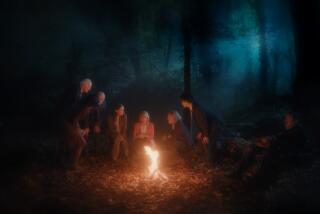The Superpower Superjoke : SUMMIT<i> by D.M. Thomas (Viking: $15.95; 160 pp.) </i>
- Share via
When God rested on the seventh day, He really did rest. No phone calls. No catching up on the mail. No reorganizing the files. And no fooling around with little toy worlds after working all week on the big one.
In his Soviet trilogy--”Ararat,” “Swallow,” and “Sphinx”--the novelist D. M. Thomas built a complex, bravura game of narrative Chinese boxes. His characters turned into characters written or related by other characters who, in turn, dissolved into the dream states of still others.
It was extravagant and sometimes out of hand, but usually fun and often thrilling. The thrill came from the seriousness to which the fun attached. The characters--poets, police spys, historical figures, and assorted Moscow denizens--tossed comically about; but what tossed them was the wind of contemporary history. They babbled absurdly in their sleep; their nightmares were real, and they were ours.
The trilogy was a work of sustained, sometimes strained imagination. And now, with “Summit,” Thomas discards the sustenance and most of the imagination. In a prefatory note, he tells us that he is reverting to what he calls “an ancient tradition in which a serious trilogy is succeeded by a farcical or satirical coda.”
He is having fun, in other words. He is having most of it.
“Summit” is a 160-page joke, a fantasy take-off on a summit conference between a senile President O’Reilly, lavishly based on President Reagan, and the Soviet leader Grobichov, who looks like Gorbachev but departs from his austere model in picking up some of the fleshly indulgences of the late Leonid Brezhnev.
The joke is the same one that Thomas used in one section of “Swallow.” President O’Reilly suffers from a mental slowdown that causes him to respond not to a question just asked, but to the one before it. This, of course, can throw things into the greatest confusion.
Thus, when an interviewer asks O’Reilly about a call-girl’s claim that he engaged in elaborate sex with her, the President’s response is directed to a previous question about his supposed ruthlessness:
“If something has to be done, I don’t believe in pussyfooting around.” The interviewer then shifts to ask if O’Reilly would authorize a nuclear first strike, and the answer comes:
“I’ll be very frank with you, Hank. There are times when you have certain fantasies. Everybody has them--we don’t need Freud to tell us that. . . .”
This kind of mental Mr. Magooism spins the plot all the way. O’Reilly, counseled by two foaming-mad hawks, goes to Geneva to meet Grobichov. Through a chain of mishearings and misspeakings, the aides are convinced that a computer game designed by O’Reilly’s 6-year-old grandson is a laser-beamed Star Wars device; and they want O’Reilly to press it upon the Soviets. The United States will promise to share the technology, but this will only be a promise. So go the calculations of the two: Secretary of State Mako (as in shark) and Secretary of Defense Requiem (as in death).
In discussing it with them, O’Reilly gets the subject mixed up with a remark by his wife about their daughter-in-law’s contraceptive arrangements. “IUD,” he mumbles. Mako and Requiem figure he means “Independent Unilateral Deterrent,” and they instruct him how to present it in Geneva.
Rather puzzled, O’Reilly dutifully insists on the IUD when he meets Grobichov. Even more puzzled, the Soviet leader acquiesces. After all, O’Reilly has agreed, in return, to mutual missile removal from Europe. Furthermore, he seems to have offered to hand over California as well. Another mental blip.
The plot gets infinitely more complicated, of course, though not a great deal funnier. O’Reilly is seduced by a sexy blonde who is introduced as Grobichov’s wife but who is really his daughter, and his mistress as well. Grobichov all but seduces Mrs. O’Reilly.
Two Palestinians attempt to hijack the two leaders and are gunned down by an Israeli agent who tries a spot of hijacking in turn. A project for scientific cooperation to resurrect the dead is agreed upon. The American vice president, Shrub--not Bush, of course--resigns after suspicions arise that he is a Soviet mole and Mrs. O’Reilly’s lover.
And so on and on, until all these extravagant misunderstandings, through a further chain of misunderstandings, devour each other, and subside into a traditionally murky and impermeable summit communique. Nothing has happened.
What fools these world leaders be, is the theme of these Bottom-Titania capers. True enough, perhaps, and Thomas gets close to workable satire not so much of the personalities as of the processes of summitry.
The inanity of the chitchat when the U.S. and Soviet leaders go off to talk privately responds to our own skepticism of what really happens on such occasions. Thomas’ wacky Geneva is within a parodist’s shouting distance of the now-you-see-it-now-you-don’t displacements of the Reykjavik meeting in 1986.
“Summit” has its clever and amusing moments, but it is not a success. The parody hovers outside the characters, instead of belonging to them. They are so frail that each joke blows them over, and the author has to prop them up again. Thomas’ breath is more audible than the notes that he gets out of this toy flute of a book.
More to Read
Sign up for our Book Club newsletter
Get the latest news, events and more from the Los Angeles Times Book Club, and help us get L.A. reading and talking.
You may occasionally receive promotional content from the Los Angeles Times.










